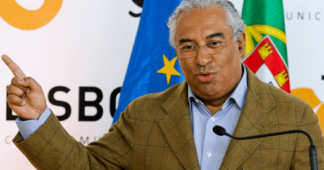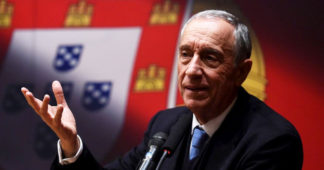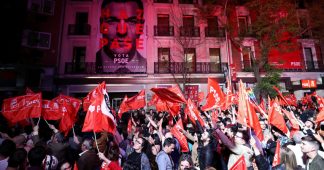An interview with Jorge Costa
Nov.17, 2021
Portuguese premier António Costa has called a snap general election in a bid to end his dependency on left-wing parties’ votes in parliament. The split owes to his refusal to roll back attacks on labor rights imposed by the previous right-wing government.
The vote comes in a complicated scenario, characterized by not only the pandemic but also the rise of the far right, in a country which had hitherto remained on the fringes of this phenomenon. Jacobin’s Brais Fernández spoke to Jorge Costa MP, a leading member of the Left Bloc, about the government’s collapse, the coming election, and the concerns of working-class Portugal.
BFAfter years of Socialist Party rule, Portugal is heading for new elections. What happened?
JCThe 2015 elections, after the troika intervention in Portugal, created a new situation. While the right-wing coalition came in first place, it was in a minority in Parliament, and the Left Bloc and Communist Party both said they were ready to reach an agreement with the Socialists, to prevent a right-wing government. This was an agreement for the parliamentary term, and did not bring these parties into the executive: rather, a series of programmatic measures would be agreed, in exchange for their support for a Socialist Party minority administration.
These agreements established measures and timetables for boosting incomes: thirty-five-hour weeks for state employees, an increased minimum wage, tax relief for employment income, and the unfreezing and recovery of the lowest pensions. This furthermore blocked any new privatizations. The stabilization of this framework also allowed the Left to achieve further advances, such as the regularization of precarious state workers, social protections for the “self-employed,” reduced university fees, a new basic health law, and a (still-ongoing) process to decriminalize assisted dying.
This political framework, which the Right derogatorily baptized the “geringonça” (a nickname later adopted by the supporters of the agreement), created a new context of social relief and also of determination to assert demands, especially coming from state employees and precarious layers. This period also saw new mass movements, with Portugal’s biggest-ever feminist and anti-racist demonstrations, as well as important youth mobilizations for climate justice.
Yet, the limitations of this framework soon became apparent. The Socialist Party obeyed orders from Brussels in decisions such as the application of bank resolution rules in the case of the Banco Espírito Santo; the containment of public investment to anemic levels; and the lack of a substantive rebuilding of public services hit by troika cuts. Labor laws retained the regressive reforms made when the Right in office went beyond even what was imposed by the troika memorandum.
Despite these persistent blockages, the recovery in incomes — combined with rising demand in the tourism sector and falling interest rates on debt, thanks to European Central Bank policy — enabled a rapid recovery in growth and employment, reflected in the rise in the Socialist Party’s polling numbers.
In 2018–19, the Socialist Party turned toward a confrontation that would allow it to appeal to be given an absolute majority in the then-looming general election. The party president, Carlos César, went so far as to refer to the forces of the Left as an “impediment” to good government by the Socialists. But the appeal failed. In the October 2019 contest, the left-wing parties essentially maintained their existing positions (Bloco 9.5 percent, with the same number of deputies; and the Communist Party 6.3 percent). While the Socialist Party elected 108 deputies, surpassing the right-wing parties, it was still seven seats short of an absolute majority. Immediately, new negotiations began, but now without the same “state of necessity” as 2015.
The Communist Party was only willing to enter into one-off negotiations, without a basic political agreement. The Left Bloc proposed to negotiate such an agreement, but on the precondition that the government reverse the troika-era regression in labor legislation. These measures had, among other things, reduced the value of overtime, cut the number of days’ paid holiday, and cut severance pay from thirty to twelve days per year worked.
Yet, the day after the meeting with the Left Bloc, António Costa met with the employers’ confederations. The new government proved unable to reach an agreement on the reform of the Labor Code. Instead, it roamed from budget to budget, ever-more openly voicing its blackmail — the threat that it would provoke a political crisis and snap elections. In all this, it treated the Left Bloc with hostility while seeking to condescend to and subordinate the Communists.
BFWhat demands were the Left Bloc and the Communist Party putting forward?
JCA few weeks after the 2019 elections, the budget for 2020 was still viable thanks to the abstention of the Left Bloc and Communist MPs (and the three elected for the animal-rights party, PAN). This was itself possible thanks to a significant boost in health spending. But already last year, the 2021 budget received a no vote from the Left Bloc, after a negotiation in which we again focused on the elimination of the troika’s labor law rules and other structural social policies.
Based on the lessons of the pandemic, we also advanced proposals to modify the extraordinary benefits created for the emergency response and to prepare a new anti-poverty social benefit. This would strengthen the already existing offer by making it broader and getting rid of arbitrary exclusionary measures.
Faced with the vulnerabilities that the pandemic revealed in the National Health Service, the Left Bloc proposed a remuneration scheme dedicated to health professionals. This aimed to attract and retain staff for the public health system, thus allowing it to hold onto the professionals (doctors and nurses in particular) who are today being drained away by private hospitals through their better financial offer.
The government refused all this. The budget for 2021 was approved only with the abstentions of the Communist Party (whose main achievement was the guarantee of the payment of 100 percent of basic salary to the workers laid off in extraordinary circumstances) and the animal-rights party PAN. At this stage, the Communists continued to argue that the labor laws, not being strictly budgetary issues, should be negotiated by the government with the unions.
However, they changed this position in the negotiation of the 2022 budget. The Communist Party began to insist on the acceleration of the minimum wage hike and the removal of troika measures from Portuguese labor legislation — as the Bloc had been strongly doing already since the proposals for an agreement after the 2019 election. These issues were enough for the Communist Party to pass over to voting no on the budget.
Faced with this opposition, even as the budget debate was still ongoing, António Costa opted for snap elections, and the bid for an absolute majority.
BFThe Socialist Party has gained strength electorally — but, according to polls, not enough to achieve an absolute majority. Why did it decide to force elections?
JCThe upcoming elections are a referendum on the prime minister. Costa will face a tough test to survive if he fails to get an absolute majority after provoking early elections. He is betting that he can get a majority through voters punishing the left-wing parties for rejecting the budget, and through the fiasco on the Right, which is now riven by internal leadership disputes and haunted by pressure from the extreme right. This is the reason why many moderate voters, despite their dissatisfactions, may prefer continuity to a change of government. But all these calculations are yet to be born out in practice…
As I have already mentioned, the Socialist Party government has been characterized by its subordination to EU dogma. Even in an exceptional situation, in which the rules of the budgetary treaty have been suspended, Portugal is among the lowest-ranking developed countries in terms of public investment in response to the crisis. This, despite it having the fiscal headroom for further progress. This alignment also blocks any measures unfavorable to big capital, whether that means the real estate sector, rentier electricity companies, or private health care.
BFThe Portuguese experience points to the complexity of the Left’s relationship with Europe’s Socialist Parties. On the one hand, these are socio-liberal or progressive-neoliberal parties. But, in the context of the rise of the far right or consolidation of the traditional right, they do appear as an option for much of the left-wing electorate, even while these parties remain immersed in a historic crisis. What kind of relationship do you propose with the Socialist Party?
JCThe Left Bloc’s relationship with the Socialist Party has always been marked by intense political conflict. The Socialist Party is, like the PSD [the center-right Social Democratic Party], the main protagonist of Portugal’s model of conservative modernization, which explains why this country continues to lag behind in many areas. Their shared model ranges from the privatization of strategic sectors of the economy to the creation and consolidation of measures to muzzle workers on the shop floor.
Over the last two decades, this conflict [between the Left Bloc and the Socialist Party] has given way to important areas of convergence (on the decriminalization of drug use, or LGBT rights). But it has persisted in key areas of social and financial policy. If in 2015 the Left Bloc had mistakenly believed there was sufficient trust and the right programmatic conditions to have ministers of its own in a coalition, such a government would have lasted only a few weeks. In December 2015, only two months after the elections, the Socialist Party sold a bank that had relied on state intervention, Banif, to Santander, with losses of €3 billion for the Portuguese state. No left-wing minister could approve such a decree.
The “geringonça” (the agreements from 2015 to 2019) has sometimes been treated in the international debate as a “model.” For us, it does not represent a model, for it is the fruit of very particular national circumstances. It was a minority government by a centrist party, not a left-wing government. Its parliamentary base was the result of important commitments to political change: the end of austerity and the recovery of the population’s incomes.
This platform then ran out of steam. The Socialist Party refused to accept the Left’s demands that its support be matched by the recovery of lost labor rights (essential to correcting the prolonged stagnation of average wages) or indeed the creation of conditions allowing the continuity of a public health system today being degraded by private predation.
BFPortugal seemed to be one of the last countries in Europe without a significant extreme right. This was, after all, a country whose Constitution was the product of the overthrow of a dictatorship by an alliance between sectors of the army and the popular classes. But now there is the phenomenon called Chega (Enough!). What is the Portuguese far right like — and what explains its rise?
JCIn the current reorganization of the Portuguese right, two new poles stand out. One is the extreme right and the other is ultraliberal. Both share the same economic program, based on tax benefits for the rich and the privatization of public services. The radicalization of the entire right — the heir to the troika, hostile to the welfare state and, in Chega’s case, openly racist — is an international process. Trump’s presidency fueled the current energizing this radicalization. This international dynamic, above all, drove the launch of Chega.
With this impetus, a handful of militants from extreme right-wing groups and others disaffected with the [center-right] PSD (who left the party after the end of former premier Pedro Passos Coelho’s term) jumped across to Chega. Conservative elements coming out of the traditional right-wing parties (PSD and CDS [the People’s Party]) thought that the time had come to assert an ultra-reactionary and ultraliberal program. They managed to rally enough political flotsam and jetsam to achieve a significant territorial presence and absorb the electorate of the moribund CDS, achieving significant local electoral breakthroughs.
A part of Chega’s electorate is in the underprivileged peripheries and comes from former nonvoters. But another part is an old ultraconservative or Salazarist electorate that has for years been taking shelter under the banners of the traditional right. We shall see how Chega does faced with the appeal for a “pragmatic vote” for PSD. But it is a force that has already conquered a space for itself.
The vast majority of the Portuguese electorate has no direct memory of the dictatorship and the war, which ended almost half a century ago. Chega has a very male and old electorate, although the nostalgic side of its discourse is much less open than that of Vox in Spain, for example. It is a Right that expresses aggressive machismo, which exploits the tension in the peripheries, hatred of Romani people and Muslims, and in general of the poor, whom it calls “welfare-dependent.”
More important among the youth in Portugal is the growth of the Liberal Initiative. This right-wing party promotes brutally individualistic and “meritocratic” rhetoric, of libertarian and anti-communist impulses, coming also from segments of the PSD and CDS. In the 2019 election, it ran for the first time and elected only one MP, but has prospects for growth.
The Left Bloc confronts the fragmented Portuguese right starting by noting its common heritage — the policies of the troika — and its ardor to privatize. The pandemic showed what a threat such an agenda is to the welfare of most of the population. Indeed, during the pandemic, the role the state had in health, education, and in sustaining employment effectively silenced the right-wing propaganda.
As for the fight against Chega, in addition to exposing the party’s links with highly undesirable sectors of the economic elite or with the most fanatical and dangerous negationism, the Left Bloc has kept the issues of migration, refugees, racism, and historical memory on the agenda. We refuse to cave to the pressure of a violent and revisionist common sense that is emerging. Also important is the social presence of a new black movement, which is very youthful and inspired by Black Lives Matter. The Left Bloc maintains close relations with it.
BFHow are the center-right PSD and the rest of the right wing approaching the elections?
JCToday, the Right is experiencing a period of fragmentation, with the battle for the leadership of the PSD, the disappearance of the CDS, the emergence of a new ultraliberal party and the sharp rise of Chega, a force led by a PSD defector and which will draw its most direct inspiration from Vox in Spain. This fragmentation explains how come since the troika intervention in the first half of the 2010s, the Right has not been able to surpass one-third of the vote.
Indeed, Chega’s rise further aggravates this situation. For whatever the right-wing leaders’ assurances that racists will not be part of their governments, a section of the “centrist” electorate, which oscillates between the Socialist Party and the PSD, fears that a vote for the traditional right will eventually bring the extreme right into the sphere of decision making. For now, the Right’s prospects of electoral victory look slim.
BFPortugal is an exceptional case where two left-wing forces — one more philo-Soviet (the Communist Party) and the other more linked to the radical traditions that reemerged in the post-1968 era (Left Bloc) — were able to consolidate their forces even at the height of neoliberalism. How are relations between these parties?
JCThe relations between the Left Bloc and the Communist Party are distant. The Communist Party has a profoundly “campist” reading of the world situation, which leads it to defend regimes ranging from the Chinese Communists to Vladimir Putin, and from the Assad dynasty in Syriza to the part of the Angolan oligarchy that has fallen into disgrace.
In terms of civil rights, I’ll give some examples of divergences: the Communist Party is against euthanasia and the legalization of cannabis, rejects gender parity in electoral lists, denies that a problem of structural racism exists in this country, and has only belatedly adopted a broad program on LGBT issues.
Despite these differences, we agreed on the vast majority of parliamentary votes of an economic or social nature. This could have raised the possibility of political collaboration, but unfortunately the Communist Party has always refused, not only to tripartite meetings with the Socialist Party while the agreements were in force, but even to regular bilateral collaboration, allowing us to combine our agenda and our efforts.
Communist trade union leaders have in recent years been busy stripping militants linked to the Left Bloc and other currents of their responsibilities, to the point of refusing to hold the debates proposed by the minorities within the union confederation leadership.
BFWhat does the landscape of social mobilization look like?
JCThe pandemic had a very strong impact on social movements and struggles. The successive lockdowns and social isolation led to a generalized demobilization and the breaking off of activist ties.
There have been isolated struggles in health care, public services, and in vulnerable professions such as security and cleaning. In public services, in particular, several strikes planned in preparation for the elections were suspended. It is still too early to assess the full weight of the pandemic’s effect, in terms of aggravating a long cycle of desertification of the unions and weak levels of social conflict. But it in any case raises difficult questions for an antagonistic left which depends on organizing confrontations, articulating at both the parliamentary and social levels proposals backed by mobilization and the support of the social majority.
In recent months, there have been some signs of recovery in the climate justice movement and in the anti-racist and Afro-descendant struggle (which produced the largest demonstration during the pandemic period, associated with the worldwide protests against the murder of George Floyd on June 6, 2020). But the feminist movement has not yet managed to resume the upward cycle it had in the period immediately prior to COVID, when it took to the streets with unprecedented force.
BFFinally, the debate on the EU question has taken on a new currency in the pandemic. How do you assess the situation at the European level?
JCThe pandemic crisis has deepened the asymmetries between the Eurozone states. The funds for economic recovery have appeared late, are insufficient and, for the most part, generate new debts. Admittedly, the German taboo on debt mutualization has been partially broken. But while the German economy benefits from massive state aid, the governments of the most heavily indebted countries voluntarily submit to budgetary strangulation because they anticipate that the deficits now being authorized will trigger austerity measures in the near future.
The taboo of direct European Central Bank financing to states has not been broken, and nor have the budgetary rules, which have proven so counterproductive, crisis after crisis. With these rules, the financial resources now being mobilized may even aggravate the asymmetries that already exist within the EU, as demonstrated by the disparity between national crisis-response plans.
No reconstruction program will be far-reaching enough if it does not include the restructuring of sovereign debts (in particular the debt held by the ECB) and a break with the neoliberal treaties that attack public services and state investment.
Published at www.jacobinmag.com
Also read
Opinion polling for the 2022 Portuguese legislative election
We remind our readers that publication of articles on our site does not mean that we agree with what is written. Our policy is to publish anything which we consider of interest, so as to assist our readers in forming their opinions. Sometimes we even publish articles with which we totally disagree, since we believe it is important for our readers to be informed on as wide a spectrum of views as possible.











